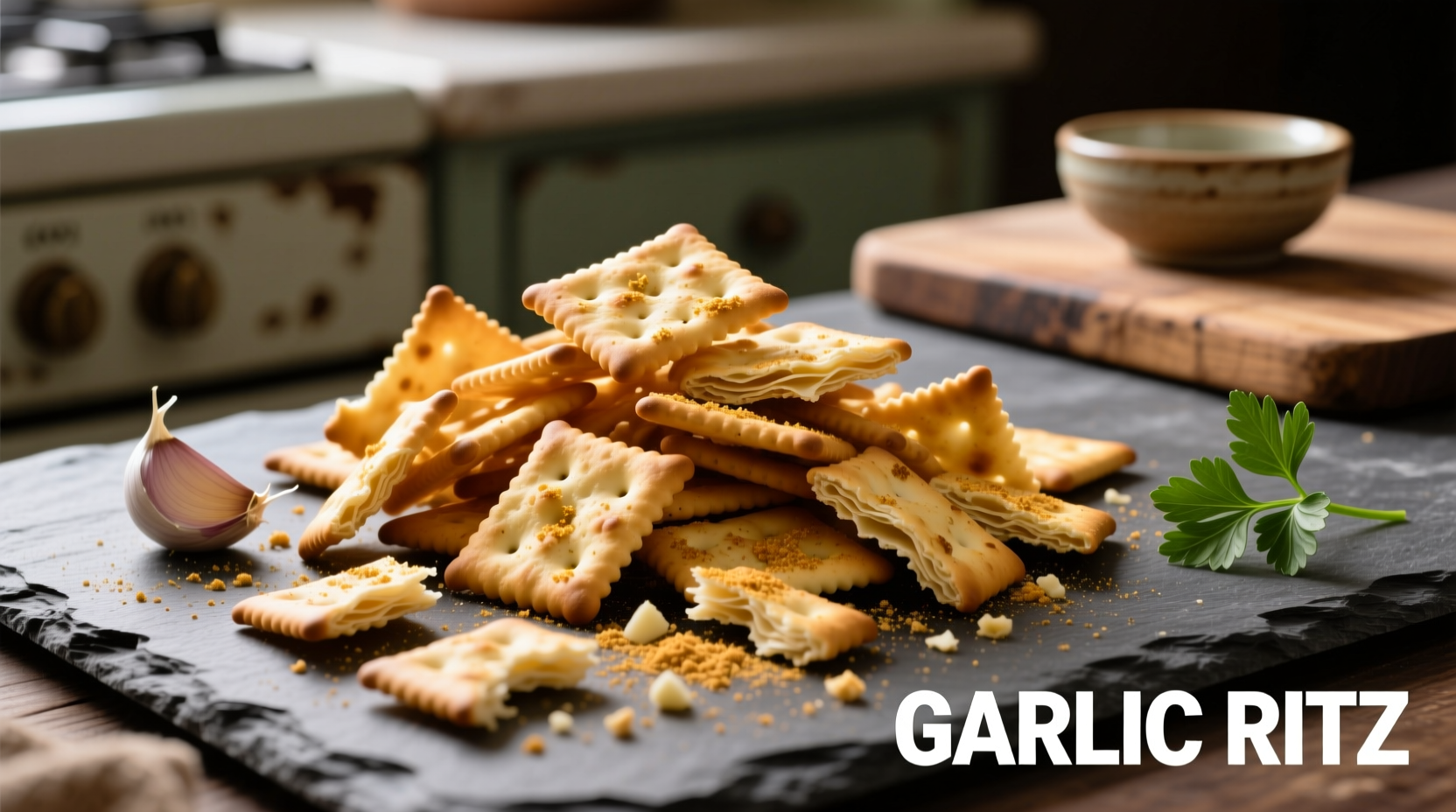Discover everything you need to know about garlic Ritz crackers in this comprehensive guide. Whether you're curious about their ingredients, seeking creative serving ideas, or wondering how they compare to other snack options, we've got you covered with practical insights you can use immediately.
What Makes Garlic Ritz Crackers Unique
Garlic Ritz crackers maintain the iconic layered, buttery texture of traditional Ritz while introducing a savory garlic flavor profile that elevates them from simple snack to culinary versatile ingredient. The distinctive taste comes from a carefully balanced seasoning blend that includes real garlic powder, onion, parsley, and paprika, creating a flavor that's pronounced but not overpowering.
Unlike many flavored crackers that sacrifice texture for taste, garlic Ritz preserves the signature flakiness that made the original version popular since 1934. This combination of reliable crunch and savory flavor makes them stand out in the crowded cracker market.

Understanding the Flavor Profile
The taste experience of garlic Ritz crackers unfolds in distinct layers. When you first bite in, you notice the familiar buttery richness of the original cracker. This is quickly followed by a subtle garlic presence that's more aromatic than pungent, complemented by hints of onion and herbs. The aftertaste is clean with just enough garlic essence to be satisfying without lingering unpleasantly.
Food scientists at Mondelez International (the manufacturer) have carefully calibrated the garlic-to-cracker ratio to ensure the seasoning enhances rather than overwhelms the base product. This balance explains why garlic Ritz has maintained popularity while many other flavored cracker varieties have come and gone.
Practical Culinary Applications
Garlic Ritz crackers shine beyond simple snacking. Their robust flavor makes them particularly valuable in cooking applications where regular crackers might get lost:
- Appetizer bases - Hold up well under toppings like cream cheese and smoked salmon without becoming soggy
- Crumb coatings - Create flavorful crusts for chicken, fish, or vegetables
- Soup accompaniment - Complement tomato-based and vegetable soups better than plain crackers
- Cheese pairings - Balance well with sharp cheddar, brie, and blue cheeses
Nutritional Comparison: Garlic vs Regular Ritz
| Nutrient | Garlic Ritz (8 crackers) | Regular Ritz (8 crackers) |
|---|---|---|
| Calories | 130 | 120 |
| Total Fat | 6g | 5g |
| Sodium | 220mg | 180mg |
| Carbohydrates | 16g | 15g |
| Protein | 2g | 2g |
As shown in the USDA FoodData Central database, garlic Ritz crackers contain slightly more sodium and calories than their regular counterparts due to the added seasonings, but the nutritional profile remains similar overall. Both varieties contain enriched flour, vegetable oil, and sugar as primary ingredients.
Historical Evolution of Ritz Crackers
The journey of Ritz crackers from simple snack to flavored variations demonstrates how consumer preferences have shaped this iconic product:
- 1934 - Original Ritz crackers introduced by Nabisco with their signature golden color and flaky texture
- 1950s - First regional flavor experiments begin in test markets
- 1980s - Garlic Ritz introduced as a permanent flavor option following successful regional tests
- 2000s - Recipe refinement to reduce trans fats and adjust sodium levels
- 2010s - Packaging redesign for better freshness retention
- 2020s - Continued popularity despite growing artisanal cracker market
According to food industry reports from IBISWorld, the introduction of garlic flavor helped expand Ritz's market beyond traditional snack occasions into cooking applications, contributing to the brand's sustained relevance in an increasingly competitive cracker market.
When Garlic Ritz Works Best (And When to Choose Alternatives)
Understanding the appropriate context for using garlic Ritz crackers can significantly impact your culinary results:
- Ideal for: Tomato-based soups, cheese plates, savory toppings, and recipes where garlic complements other ingredients
- Limited effectiveness: With delicate seafood dishes, sweet applications, or when a neutral cracker flavor is preferred
- Better alternatives: When making dessert crusts (try graham crackers) or when serving with mild cheeses (regular Ritz or water crackers work better)
Professional chefs often note that garlic Ritz performs best when its flavor can integrate with other savory elements rather than dominate the dish. As Antonio Rodriguez explains in his culinary workshops, "The garlic seasoning should enhance, not overpower—think of it as the supporting actor in your dish, not the star."
Storage and Freshness Tips
Proper storage significantly extends the shelf life and maintains the crisp texture of garlic Ritz crackers:
- Keep unopened packages in a cool, dry pantry away from heat sources
- After opening, transfer to an airtight container (glass works best)
- For long-term storage, include a silica packet to absorb moisture
- Never store near strong-smelling foods as crackers can absorb odors
- Check the "best by" date but know that properly stored crackers often remain fresh 2-3 weeks beyond this date
Food safety experts from the FDA recommend discarding crackers that develop an off smell, become soft, or show any signs of mold, as these indicate spoilage that could cause foodborne illness.
Simple Homemade Alternative
If you're out of garlic Ritz or prefer to control the ingredients, this easy alternative delivers similar results:
- 8 regular Ritz crackers
- 1/8 teaspoon garlic powder
- Pinch of dried parsley
- Pinch of onion powder
- Light spray of olive oil
Mix seasonings, lightly spray crackers with oil, sprinkle evenly with seasoning mix, and bake at 350°F for 3-5 minutes until fragrant. This method lets you adjust garlic intensity to your preference while maintaining the familiar texture.











 浙公网安备
33010002000092号
浙公网安备
33010002000092号 浙B2-20120091-4
浙B2-20120091-4